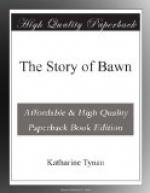I came up with her in a little glade away from the main path, a mere gamekeepers’ passage, now much overgrown and choked up, for it was long since we had kept gamekeepers. I had to creep on my hands and knees through the briars and undergrowth to reach the place where she was, which was a clear space in the midst of the tangle.
As soon as she saw me she left off yelping and waited for me with an air of expectancy, as though she knew that I would soon put an end to her discomfort.
But alas for the poor thing’s faith in me, I saw when I came up to her that her foot was caught in a trap, a horrible iron-toothed thing, the like of which I had never seen before. It must have rusted there from the old days till my poor dog by some accident had released it. I saw that there were bones by it—the bones of some poor wild creature, doubtless, who had perished in it, and the bones had no doubt acted as a warning to the others.
As I knelt down Dido licked my face frantically, being quite sure I was going to release her. But that was not so easy. Pull as I would I could not bring the teeth of the trap apart.
“I shall have to go for help, Dido,” I said, after a few minutes, trusting to her sense to understand. But as I rose to go and she saw that I was leaving her, she began immediately a loud, almost hysterical barking, interspersed with little piteous moans and whimpers which were most painful to hear.
I did not know what to do, so I began to cry myself, and then I knelt down beside her and began again my useless effort to release her.
The sun by now was sinking low, although there would be light for an hour or two yet. I guessed that it must be seven o’clock, and I knew that my grandmother would be uneasy about me, and that presently my grandfather would have to be told, and the whole household would be anxious. What was I to do? I could not even think that they would come this way looking for me, since they had not known of my intention of coming home by Daly’s Wood and the postern.
I was in the greatest perplexity and distress, and I never was so glad in my life as when I heard a shout close at hand. I believe that if it had been Richard Dawson himself I should have welcomed him at that moment.
“Come this way, please,” I called out. “My dog is caught in a trap and I cannot leave her.”
I heard some one come as I had come, on hands and knees, through the undergrowth; then he emerged into the little glade and stood upright, the grass and the leaves about his clothing.
He did not look at me at first, but came, with that clucking of the tongue against the palate which we use in Ireland as a sound of pity and concern, to the rescue of the dog. His hands, fine and long and slender, tore the trap apart as though it had been paper.
“Poor beast!” he said, “she is very little the worse. The teeth of the trap had grown blunt, although they were strong enough to hold her.”




